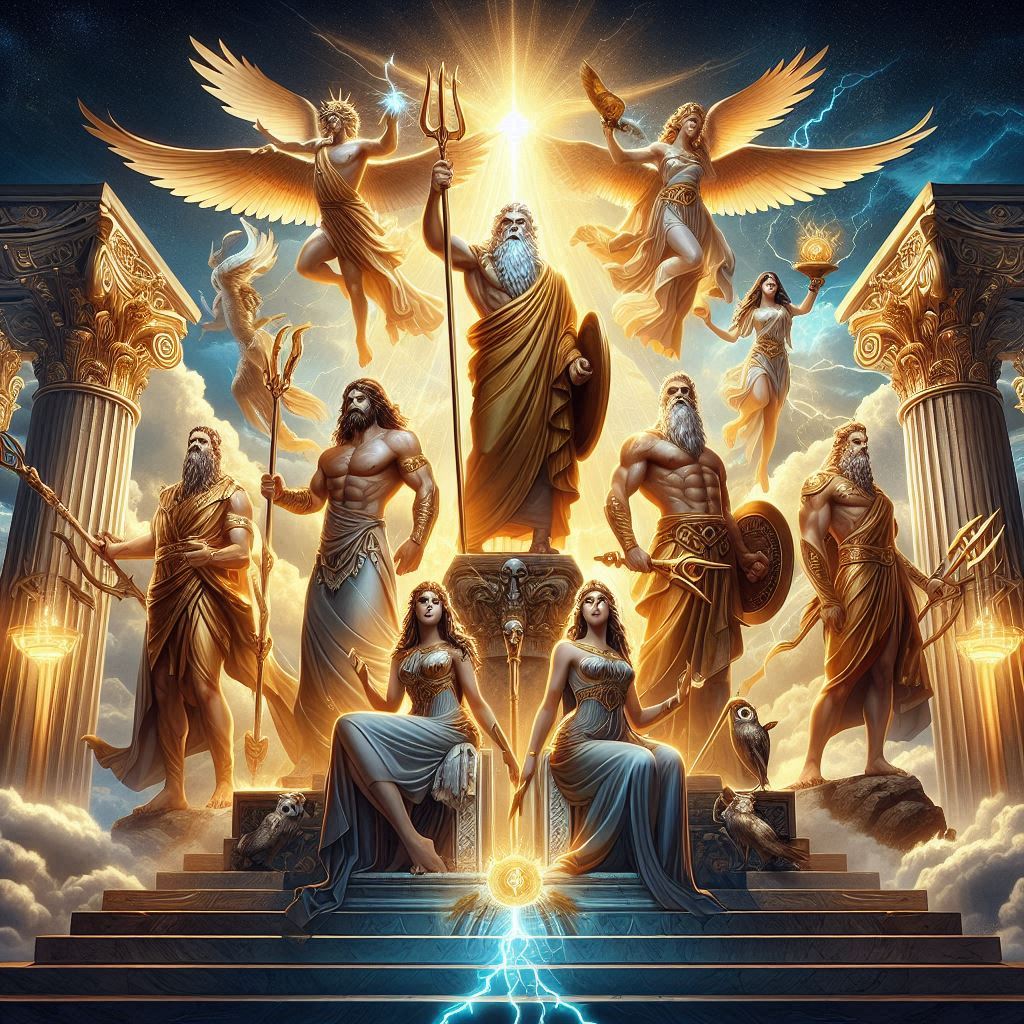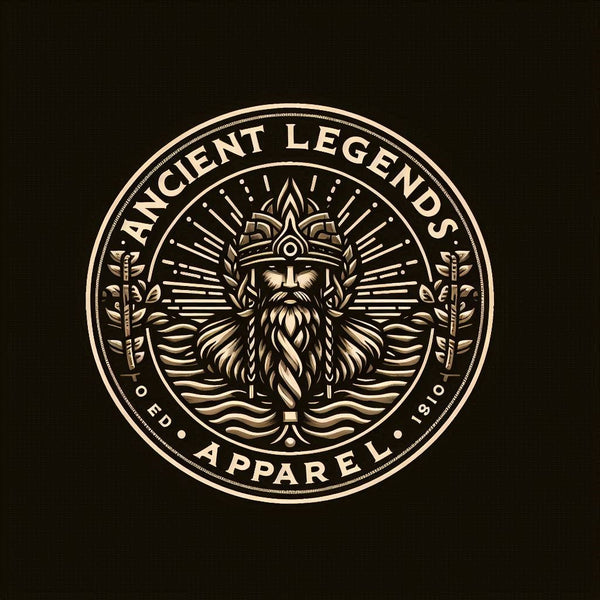
The Twelve Olympians: Meet the Most Powerful Gods of Ancient Greece
Karl FinnbogasonShare
The Twelve Olympians were the most powerful and revered deities in Greek mythology, ruling from Mount Olympus. These gods and goddesses played a vital role in shaping the ancient Greek world, influencing everything from war and love to wisdom and the underworld. Each deity had unique attributes, symbols, and myths that defined their divine responsibilities and interactions with mortals.
In this article, we’ll introduce you to the Twelve Olympians, exploring their domains, symbols, and lasting influence on modern culture.
1. Zeus: King of the Gods and Ruler of the Skies
Domain: Sky, Thunder, Justice
Symbols: Lightning Bolt, Eagle, Oak Tree, Throne
Zeus was the king of the gods, ruling over Mount Olympus with unmatched authority. As the god of the sky and thunder, he wielded the mighty lightning bolt, a weapon that symbolized divine wrath and power. Zeus was also known for his many affairs, fathering numerous heroes and gods in Greek mythology.
- Famous Myth: Zeus led the Olympian gods in a war against the Titans, securing their dominance over the cosmos.
- Modern Influence: His image appears in government buildings, movies (Clash of the Titans, Hercules), and even brand logos (lightning bolt designs).
2. Hera: The Queen of the Gods and Protector of Marriage
Domain: Marriage, Family, Women
Symbols: Peacock, Diadem, Cow, Pomegranate
Hera was the wife and sister of Zeus, known for her role as the protector of marriage and family. Despite being the queen of the gods, Hera was often portrayed as a jealous and vengeful goddess, punishing Zeus’ many lovers and their offspring.
- Famous Myth: Hera played a key role in the myth of Hercules, sending him into madness as punishment for being Zeus' illegitimate son.
- Modern Influence: She remains a symbol of devotion and the power of women, often depicted in literature and feminist interpretations of mythology.
3. Poseidon: The God of the Sea and Earthquakes
Domain: Oceans, Horses, Earthquakes
Symbols: Trident, Horse, Waves, Dolphin
Poseidon, brother of Zeus, ruled the seas and was feared for his ability to cause storms and earthquakes. He wielded a trident, which he used to control the waters and shake the earth. He was also the creator of horses.
- Famous Myth: Poseidon played a crucial role in The Odyssey, making Odysseus’ journey home treacherous as revenge for blinding his son, the Cyclops Polyphemus.
- Modern Influence: His image is widely used in nautical and marine themes, sports teams, and surf brands.
4. Demeter: The Goddess of Agriculture and Fertility
Domain: Harvest, Agriculture, Fertility
Symbols: Sheaf of Wheat, Cornucopia, Torch, Poppy
Demeter controlled the harvest and the fertility of the earth, ensuring that crops would grow. She was deeply connected to seasonal changes.
- Famous Myth: Her grief over the abduction of her daughter Persephone by Hades led to the creation of the seasons.
- Modern Influence: Her symbolism is evident in agricultural festivals and Earth-related movements.
5. Athena: The Goddess of Wisdom and Warfare
Domain: Wisdom, War, Strategy
Symbols: Owl, Olive Tree, Aegis (Shield), Spear
Athena was known for her intellect and strategic warfare, unlike Ares, who represented chaotic war. She was born fully grown and armored from Zeus' head.
- Famous Myth: She gifted the olive tree to Athens, earning the city’s devotion.
- Modern Influence: Athena is a symbol of wisdom and justice, appearing on university emblems and military insignia.
6. Apollo: The God of the Sun, Music, and Prophecy
Domain: Sun, Music, Healing, Prophecy
Symbols: Lyre, Laurel Wreath, Sun, Bow and Arrow
Apollo was the god of the arts and healing, as well as a divine archer. He was known for his oracle at Delphi, where people sought guidance for the future.
- Famous Myth: He slayed the Python, the serpent of Delphi, to claim his prophetic temple.
- Modern Influence: His name appears in NASA’s Apollo space missions and numerous artistic representations.
7. Artemis: The Goddess of the Hunt and Wilderness
Domain: Hunting, Moon, Nature
Symbols: Bow and Arrow, Moon, Deer, Cypress Tree
Twin sister of Apollo, Artemis was a protector of the wilderness and patron of hunters and young women.
- Famous Myth: She turned Actaeon into a stag for spying on her while bathing.
- Modern Influence: Her symbols are commonly seen in environmental and feminist movements.
8. Ares: The God of War and Violence
Domain: War, Bloodshed, Chaos
Symbols: Spear, Shield, Vulture, Dog
Ares was the god of war in its most brutal form, embodying the destruction and chaos of battle.
- Famous Myth: He had a long, tumultuous love affair with Aphrodite.
- Modern Influence: His image is often used in military insignia and sports branding.
9. Aphrodite: The Goddess of Love and Beauty
Domain: Love, Beauty, Desire
Symbols: Dove, Rose, Seashell, Mirror
Aphrodite, born from sea foam, was the embodiment of beauty and romantic love.
- Famous Myth: Her rivalry with Hera and Athena led to the Trojan War.
- Modern Influence: She inspires perfumes, beauty brands, and romantic themes.
10. Hermes: The Messenger of the Gods
Domain: Travel, Commerce, Trickery
Symbols: Caduceus, Winged Sandals, Winged Helmet
Hermes was known for his speed and cunning, serving as the gods’ messenger and protector of travelers.
- Famous Myth: He guided souls to the Underworld.
- Modern Influence: His caduceus staff is used in medical symbols.
11. Hephaestus: The God of Fire and Craftsmanship
Domain: Blacksmithing, Fire, Technology
Symbols: Hammer, Anvil, Tongs, Volcano
Hephaestus was the divine blacksmith, forging weapons and armor for the gods.
- Famous Myth: He crafted Zeus’ thunderbolts and Achilles’ armor.
- Modern Influence: He represents engineering and craftsmanship.
12. Dionysus: The God of Wine and Celebration
Domain: Wine, Theater, Ecstasy
Symbols: Grapevine, Thyrsus (Pinecone Staff), Theater Masks
Dionysus was the patron of festivals, known for his influence on wine, pleasure, and drama.
- Famous Myth: He introduced wine-making to humans.
- Modern Influence: His themes are common in music festivals and the arts.
The Everlasting Legacy of the Olympians
The Twelve Olympians shaped ancient Greek culture and their influence endures today in literature, film, brands, and art. Their myths, filled with passion, wisdom, and power, continue to inspire the world, proving that the legacy of these gods remains timeless.
